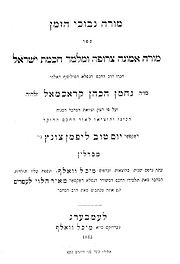- Krochmal
-
Nachman Kohen Krochmal (* 17. Februar 1785 in Brody, Galizien; † 31. Juli 1840 in Ternopil) war ein jüdischer Religionsphilosoph, Historiker und Autor. Sein Buch, das er zunächst "Tore des geläuterten Glaubens" nannte, wurde 1851 von Leopold Zunz postum unter dem Titel "Führer der Verwirrten dieser Zeit" herausgegeben, als Anspielung auf das Buch Führer der Verwirrten von Maimonides.
Leben
In seiner Jugend erwarb sich Krochmal eine breite Bildung und erlernte neben Tora und Talmud auch jüdische Philosophie, las die Briefe von Maimonides und Abraham ibn Esra und erlernte verschiedene Fremdsprachen. Mit Hilfe seiner Deutschkenntnisse studierte er die Werke von Kant, Hegel, Fichte und Schelling. Daneben erlernte er Latein, Französisch, Arabisch und Syrisch. Seine Schüler bestätigten später seine umfassende Bildung.
Im Alter von 14 Jahren heiratete Krochmal und zog zu seinem reichen Schwiegervater nach Zolkiew. 1814 begann er einen Kreis von Schülern um sich zu sammeln, führte mit ihnen Gespräche über Philosophie, Geschichte und jüdische Literatur und wurde so zu einem der bedeutendsten Vertreter der Haskala in Polen. Nach dem Tode seines Schwiegervaters begann er eine Tätigkeit als Händler. Nachdem er 1836 für zwei Jahre nach Brody zurückgekehrt war, verbrachte er die zwei letzten Jahre seines Lebens in Ternopil. Den Vorschlag, eine Stelle als Rabbiner in Berlin zu übernehmen, schlug er aus und befasste sich statt dessen mit der Niederschrift seines Buches, das er aber nicht mehr vollenden konnte.
Literatur
- Daniel Krochmalnik: R. Nachman Krochmal (gen. RaNaK) (1785-1840). In: Andreas B. Kilcher, Ottfried Fraisse (Hg.): Lexikon jüdischer Philosophen und Theologen. Stuttgart 2003, S. 210-214.
- Andreas Lehnardt: Rabbi Nachman Krochmal. Eine Biographie zwischen Tradition und Aufklärung. In: Folker Siegert (Hg.): Grenzgänge. Biographien auf der Grenze zwischen Judentum und Christentum, Christentum und Judentum. Münster 2002, 140-151.
- Andreas Lehnardt: Die Entwicklung von Halakha in der Geschichtsphilosophie Nachman Krochmals, in: FJB 29 (2002) S. 105-126.
- Margarete Schlüter: Jüdische Geschichtskonzeptionen der Neuzeit. Die Entwürfe von Nachman Krochmal und Heinrich Graetz, in: FJB 18 (1990) S. 175-205.
- Andreas Lehnardt: Maimonides und die Geschichtsphilosophie Nachman Krochmals, in: G. Hasselhof / O. Fraisse (Hg.), Moses Maimonides (1138-1204) - His Religious, Scientifical, and Philosophical Wirkungsgeschichte in Different Cultural Contexts, Würzburg 2004, 427-448.
- Margarete Schlüter: „Jewish Spirituality in Poland“ – Zur Rezeption früherer Konstruktionen rabbinischer Tradition in Nachman Krochmals Darstellung der Entwicklung der Mündlichen Tora, in: FJB 28 (2001) S. 103-119.
Weblinks
Personendaten NAME Krochmal, Nachman Kohen ALTERNATIVNAMEN Krochmal, Nachman KURZBESCHREIBUNG jüdischer Theologe, Historiker und Autor GEBURTSDATUM 17. Februar 1785 GEBURTSORT Brody, Galizien STERBEDATUM 31. Juli 1840 STERBEORT Ternopil
Wikimedia Foundation.

